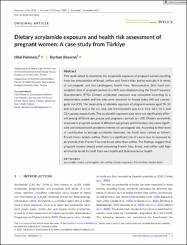Dietary acrylamide exposure and health risk assessment of pregnant women: A case study from Türkiye
Citation
Pekmezci, H. & Başaran, B. (2023). Dietary acrylamide exposure and health risk assessment of pregnant women: A case study from Türkiye. Food Science & Nutrition. https://doi.org/10.1002/fsn3.3828Abstract
This study aimed to determine the acrylamide exposure of pregnant women resulting from the consumption of bread, coffee, and French fries and to evaluate it in terms of carcinogenic and non-carcinogenic health risks. Retrospective 24-h food consumption data of pregnant women (n = 487) was obtained using the Food Frequency Questionnaire (FFQ). Dietary acrylamide exposure was calculated according to a deterministic model, and the data were assessed by hazard index (HI) and carcinogenic risk (CR). The mean daily acrylamide exposure of pregnant women aged 18-30 and >= 31 years and in the 1st, 2nd, and 3rd trimesters was 31.4, 35.4, 38.7, 31.3, and 32.4 mu g/day, respectively. The acrylamide exposure data were not significantly different among different age groups and pregnancy periods (p > .05). Dietary acrylamide exposure in pregnant women of different age groups and trimesters may cause significant and serious health problems in terms of carcinogenic risk. According to their level of contribution to average acrylamide exposure, the foods were ranked as follows: French fries> bread> coffee. There is a significant risk of cancer due to exposure to acrylamide from French fries and bread other than coffee. The findings suggest that pregnant women should avoid consuming French fries, bread, and coffee with high acrylamide levels for both their own health and their newborns' health.


















